23. Kinh Pháp Cú – Chương 23: Phẩm Voi Rừng – The Elephant – Song ngữ
Dhammapada Sutta (The Path of Truth)
Kinh Pháp Cú
English: Bhikkhu Khantipalo & Sister Susanna, 1993
Vietnamese: Thích Minh Châu, 1996
Illustrated Photos: Venerable-mahasi-sayadaw
Compile: Lotus group
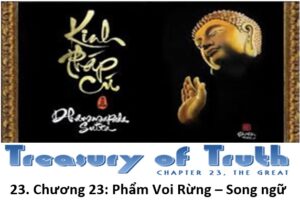
Chapter 23: Naga Vagga – The Elephant (Verse 320-333)
23. Kinh Pháp Cú – Chương 23: Giảng Lược Phẩm Voi Rừng – Song ngữ
Verse 320. The Buddha’s Endurance
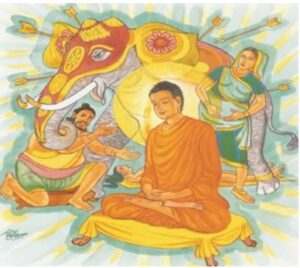
As an elephant in the battlefield,
Withstands arrows shot from bows all around,
Even so shall I endure abuse.
There are many, indeed, who lack virtue.
“Ta như voi giữa trận,
Hứng chịu cung tên rơi,
Chịu đựng mọi phỉ báng.
Ác giới rất nhiều người.”
Explanation:
As an elephant in the battlefield withstands arrows shot from bows all around, even so shall I endure abuse. There are many, indeed, who lack virtue.
- Voi xuất trận nhẫn chịu cung tên như thế nào, ta đây thường nhẫn chịu mọi điều phỉ báng như thế ấy. Thật vậy, đời rất lắm người phá giới, (thường ghét kẻ tu hành).
Verse 321. The Disciplined Animal
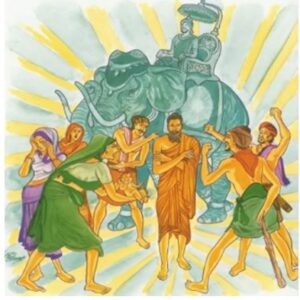
The tusker tamed they lead in crowds,
the king he mounts the tamed,
noblest of humans are the tamed
who can endure abuse.
“Voi luyện, đưa dự hội,
Ngựa luyện, được vua cưỡi,
Người luyện, bậc tối thượng
Chịu đựng mọi phỉ báng.”
Explanation:
A tamed elephant is led into a crowd, and the king mounts a tamed elephant. Best among men is the subdued one who endures abuse.
- Luyện được voi để đem dự hội, luyện được voi để cho vua cỡi là giỏi, nhưng nếu luyện được lòng ẩn nhẫn trước sự chê bai, mới là người có tài điêu luyện hơn cả mọi người.
Verse 322. The Most Disciplined Animal
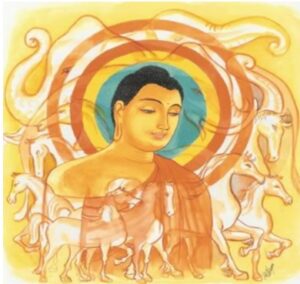
Excellent are mules when tamed
and thoroughbred from Sindh,
noble the elephant of state,
better still one tamed of self.
“Tốt thay, con la thuần,
Thuần chủng loài ngựa Xinh.
Ðại tượng, voi có ngà.
Tự điều mới tối thượng.”
Explanation:
Excellent are well trained mules, thoroughbred Sindhu horses and noble tusker elephants. But better still is the man who has subdued himself.
- Con la [1] thuần tánh là con vật lành tốt, con tuấn mã tín độ [2] là con vật lành tốt, con voi lớn Kiều la [3] cũng là con vật lành tốt, nhưng kẻ đã tự điều luyện được mình lại càng lành tốt hơn.
Verse 323. The Right Vehicle To Nibbana
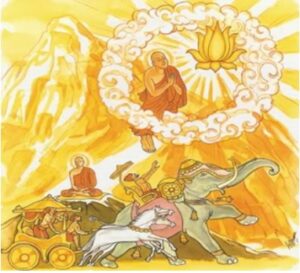
Surely not on mounts like these
one goes the Unfrequented Way
as one by self-well-tamed
is tamed and by the taming goes.
“Chẳng phải loài cưỡi ấy,
Ðưa người đến Niết-Bàn,
Chỉ có người tự điều,
Ðến đích, nhờ điều phục.”
Explanation:
Not by these mounts, however, would one go to the Untrodden Land (Nibbana), as one who is self-tamed goes by his own tamed and well- controlled mind.
- Chẳng phải nhờ xe hay ngựa mà đến được cảnh giới Niết bàn, chỉ có người đã điêu luyện lấy mình mới đến được Niết bàn thôi.
Verse 324. The Bound Elephant
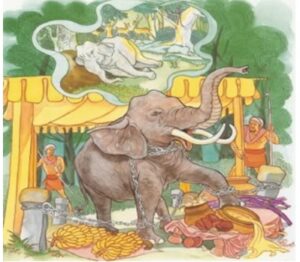
Hard to check the tusker Dhanapala,
in rut with temple running pungently,
bound, e’en a morsel he’ll not eat
for he recalls the elephant-forest longingly.
“Con voi tên Tài Hộ,
Phát dục, khó điều phục,
Trói buộc, không ăn uống.
Voi nhớ đến rừng voi.”
Explanation:
Musty during rut, the tusker named Dhanapalaka is uncontrollable. Held in captivity, the tusker does not touch a morsel, but only longingly calls to mind the elephant forest.
- Con voi tên Tài hộ (Dhamapala: hộ vệ tài sản) nhưng đến kỳ phát dục [4] thì hung hăng khó trị, khó buộc trói, lại ăn nhiều và tâm thường nhớ mẹ ở rừng sâu [5].
Verse 325. The Slothful, Greedy Sleeper Returns to Samsara, Over and Over
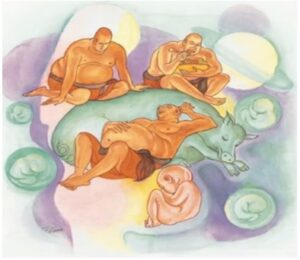
A sluggard stupid, steeped in gluttony,
who’s sleep-engrossed, who wallows as he lies,
like a great porker stuffed, engorged with swill,
comes ever and again into a womb.
“Người ưa ngủ, ăn lớn
Nằm lăn lóc qua lại,
Chẳng khác heo no bụng,
Kẻ ngu nhập thai mãi.”
Explanation:
When a man is sluggish and gluttonous, sleeping and rolling around in bed like a fat domestic pig, that sluggard undergoes rebirth again and again.
- Như heo kia ưa ngủ lại tham ăn, kẻ phàm ngu vì tham ăn ưa ngủ, nên phải bị tiếp tục sanh mãi trong vòng luân hồi.
Verse 326. Restrain Mind As A Mahout An Elephant In Rut
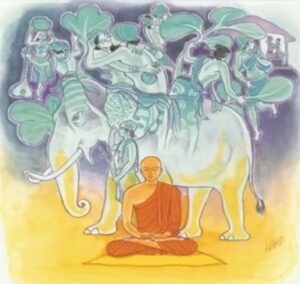
Formerly this wandering mind wandered
where it wished, where whim, where pleasure led.
Wisely this day I will restrain it
as trainer with hook an elephant in rut.
“Trước tâm này buông lung,
Chạy theo ái, dục, lạc.
Nay Ta chánh chế ngự,
Như cầm móc điều voi.”
Explanation:
Formerly this mind wondered about as it liked, where it wished and according to its pleasure, but now I shall thoroughly master it with wisdom as a mahout controls with his ankus an elephant in rut.
- Trong những thời quá khứ, ta cũng từng thả tâm theo dục lạc, tham ái và nhàn du, nhưng nay ta đã điều phục được tâm ta như con voi đã bị điều phục dưới tay người quản tượng tài giỏi.
Verse 327. The Elephant Mired
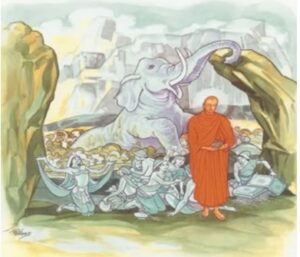
Do you delight in heedfulness
and guard your own mind well!
Draw yourselves from the evil way
as would elephant sunk in slough.
“Hãy vui không phóng dật,
Khéo phòng hộ tâm ý.
Kéo mình khỏi ác đạo,
Như voi bị sa lầy.”
Explanation:
Delight in heedfulness! Guard well your thoughts! Draw yourself out of this bog of evil, even as an elephant draws himself out of the mud.
- Hãy vui vẻ siêng năng, gìn giữ tự tâm để tự cứu mình ra khỏi nguy nan, như voi gắng sức để vượt khỏi chốn sa lầy.
Verse 328. Cherish The Company Of The Good
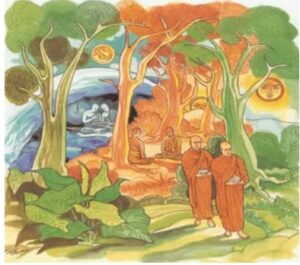
If for practice one finds a friend
prudent, well-behaved and wise,
mindful, joyful, live with him
all troubles overcoming.
“Nếu được bạn hiền trí
Ðáng sống chung, hạnh lành,
Nhiếp phục mọi hiểm nguy
Hoan hỷ sống chánh niệm.”
Explanation:
If for company you find a wise and prudent friend who leads a good life, you should, overcoming all impediments, keep his company joyously and mindfully.
- Nếu gặp bạn đồng hành hiền lương, giàu trí lực, hàng phục được gian nguy, thì hãy vui mừng mà đi cùng họ.
Verse 329. The Lonely Recluse
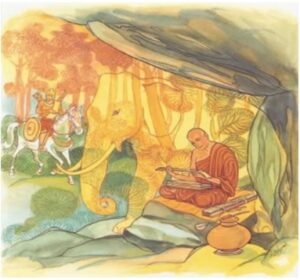
If for practice one finds no friend
prudent, well-behaved and wise,
like king be leaving conquered land,
fare as lone elephant in the wilds.
“Không gặp bạn hiền trí.
Ðáng sống chung, hạnh lành
Như vua bỏ nước bại,
Hãy sống riêng cô độc,
Như voi sống rừng voi.”
Explanation:
If for company you cannot find a wise and prudent friend who leads a good life, then, like a king who leaves behind a conquered kingdom, or like a lone elephant in the elephant forest, you should go your way alone.
- Nếu không gặp được bạn đồng hành hiền lương, giàu trí lự, thì hãy như vua tránh nước loạn, như voi bỏ về rừng.
Verse 330. For The Solitary The Needs Are Few
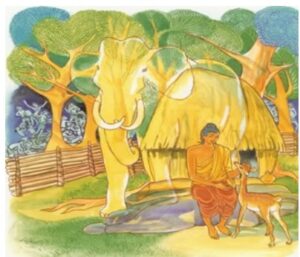
Better it is to live alone
for with a fool’s no fellowship,
no evil do, be free of care,
fare as lone elephant in the wilds.
“Tốt hơn sống một mình,
Không kết bạn người ngu.
Ðộc thân, không ác hạnh
Sống vô tư vô lự,
Như voi sống rừng voi.”
Explanation:
Better it is to live alone; there is no fellowship with a fool. Live alone and do no evil; be carefree like an elephant in the elephant forest.
- Thà ở riêng một mình hơn cùng người ngu kết bạn. Ở một mình còn rảnh rang khỏi điều ác dục như voi một mình thênh thang giữa rừng sâu.
Verse 331. The Blessed
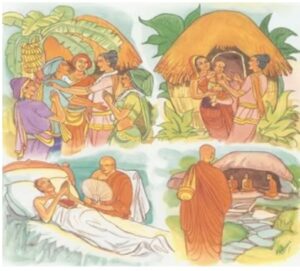
Blest to have friends when one’s in need,
blest contentment with whatever is,
blessed is merit when life’s at an end,
abandoning all dukkha is blessedness.
“Vui thay, bạn lúc cần!
Vui thay, sống biết đủ,
Vui thay, chết có đức!
Vui thay, mọi khổ đoạn.”
Explanation:
Good are friends when need arises; good is contentment with just what one has; good is merit when life is at an end, and good is the abandoning of all suffering (through Arahatship).
- Gặp bạn xa lâu ngày là vui, sung túc phải lúc là vui, mệnh chung có được thiện nghiệp là vui, lìa hết thống khổ là vui.
Verse 332. Blessing To Be An Arahat
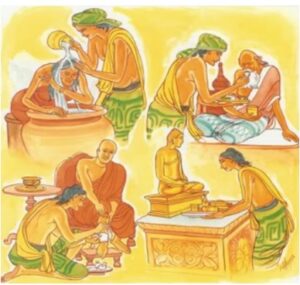
Respect for one’s mother brings happiness here
as well as respect for one’s father.
Here happiness comes from respecting the monks
and those of virtue excellent.
“Vui thay, hiếu kính mẹ,
Vui thay, hiếu kính cha,
Vui thay, kính Sa môn,
Vui thay, kính Hiền Thánh.”
Explanation:
In this world, good it is to serve one’s mother, good it is to serve one’s father, good it is to serve the monks, and good it is to serve the holy men.
- Được kính dưỡng mẹ hiền là vui, kính dưỡng thân phụ là vui, kính dưỡng Sa môn là vui, kính dưỡng thánh nhơn là vui.
Verse 333. Four Forms Of Blessing
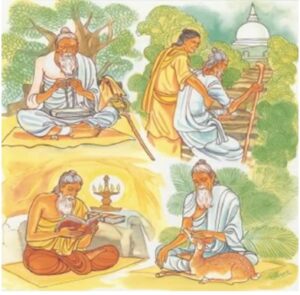
Bless is virtue till life’s end
and blest the faith standing firm,
blest the attainment of wisdom
and blest the non-doing of evils.
“Vui thay, già có giới!
Vui thay, tín an trú!
Vui thay, được trí tuệ,
Vui thay, ác không làm.”
Explanation:
Good is virtue until life’s end, good is faith that is steadfast, good is the acquisition of wisdom, and good is the avoidance of evil.
- Già vẫn giữ giới là vui, thành tựu chánh tín là vui, đầy đủ trí tuệ là vui, không làm điều ác là vui.
Chú thích:
[1] La: Do lừa và ngựa giao hợp với nhau sinh ra con gọi là La.
[2] Tín độ: (Singha) là con sông Ấn Độ. Giống ngựa tuấn (đẹp giỏi) sinh
ra ở địa phương nầy.
[3] Kiều la: (Kunjara) là tên con voi lớn.
[4] Phát dục: Voi đến kỳ phát dục thường tiết ra một thứ nước thối tha và tính tình hung hăng khó trị.
[5] Voi nhớ mẹ rừng sâu: Mượn hình ảnh con voi để Phật nhằm khuyến nhắc con người phải nên hiếu thảo với ông bà cha mẹ.
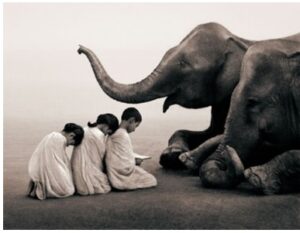
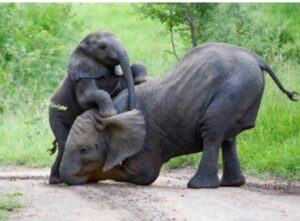
Sources:
Tài liệu tham khảo:
- http://thanhtruc-thanhtrucgdth.blogspot.com/2011/02/kinh-phap-cu.html
- http://www.buddhanet.net/dhammapada/d_great.htm
- http://www.accesstoinsight.org/tipitaka/kn/dhp/dhp.23.budd.html
- https://www.pinterest.com/pin/354799276870909443/
- Tam Tu Metta Buddhist Temple & Heritage Garden – 610 Fisher Ave, Morgan Hill, CA 95037
- https://quangduc.com/a29849/kinh-phap-cu-chu-giai-tap-4
